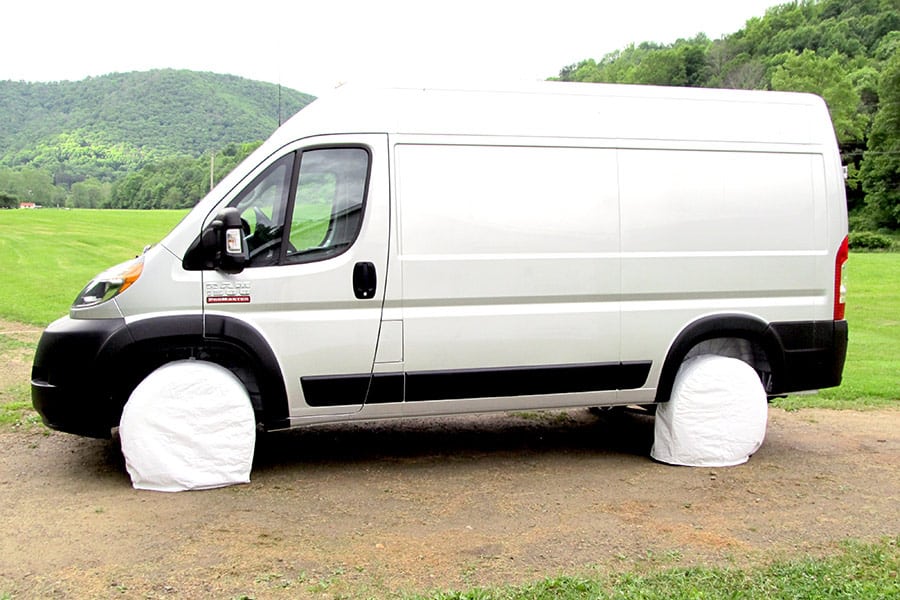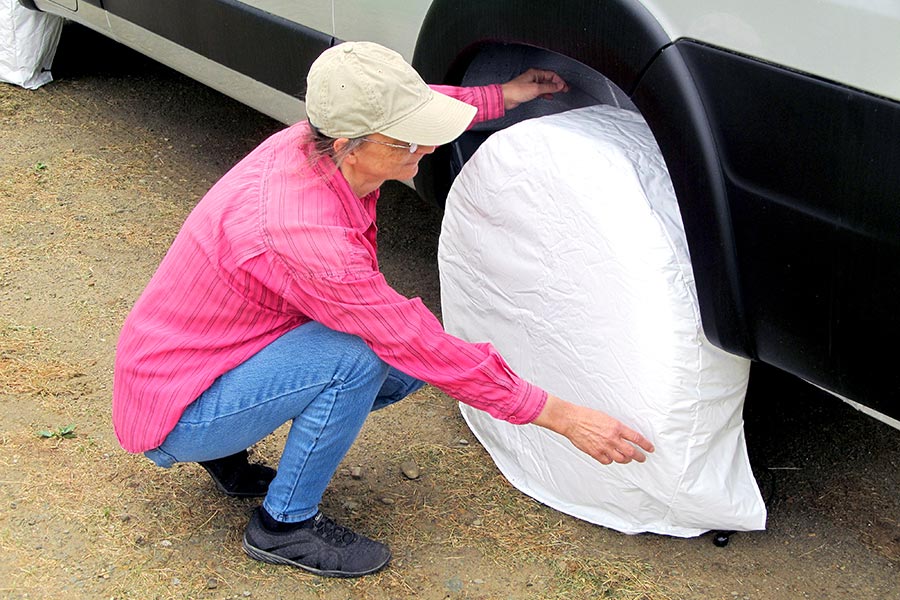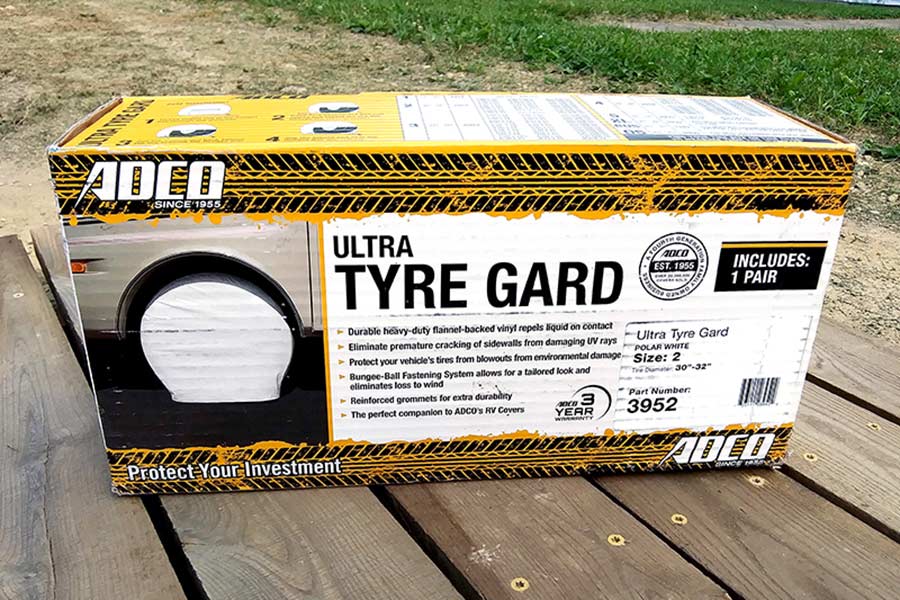
You might’ve seen camper vans with tire covers at campgrounds and in storage. Tire covers prevent a variety of issues while increasing the longevity of the tires. Let’s look at the benefits that tire covers provide.
RV tire covers are worth the investment. Covering the tires of your camper van protects them from the damaging UV rays of the sun and harsh weather effects and helps prevent discoloration. The best covers are usually made out of heavy-duty vinyl or canvas.
When you have a significant investment like a camper van, you want to do all you can to protect your investment. In this post, you’ll also learn the following information:
- Various advantages of using tires covers
- Whether or not you should use covers for your camper van
- How long do tire covers last
- How you can help protect your tires and rims
- Downsides of owning tire covers
Benefits of Protecting Tires During Winter Storage
Protecting your tires will allow you to use them for several more years. Weather conditions can wreak havoc on rubber tires, so you must do all you can to extend their life. Check out the suggestions found below if you want to benefit from using tire covers during the winter.
- Covering your tires during the winter will help protect them from the elements. If you don’t keep them covered, they’ll be more prone to sidewall cracking, which can lead to dangerous blowouts while you are on the road.
- Covers protect your tires from sunlight damage. Even when it’s cold outside, sunlight can be hard on rubber tires. It’ll weaken the material, causing them not to last as long as they could. Any tire cover material that you purchase should have UV ray protection.
- Tire covers protect your tires from dirt and dust when you store your camper van in the offseason.
- Tire covers stop your tires from losing their color. Sunlight is known to dull most colors, especially black. Your tires will end up looking a bit more like charcoal gray rather than black. Covering them will keep them looking as good as new, so why not throw on four budget-friendly covers before the season ends?
- In addition to protecting your actual tires, tire covers help protect your rims. Contaminates in the environment can be hard on the finish on your tire rims, causing pits and discoloration tire covers will also help to protect them.
Before covering the camper van tires for the offseason, get out the hose and wash the tires and rims. Use a tire brush to get all the grime and dirt off of them. You can also apply a wheel and tire cleaner to help remove dust caused by the brakes.
Allow the tires to dry completely and then apply a tire protectant to the tires before covering tires with the covers. A little extra work will help to extend the life of your tires.
As you can see, from the points I have mentioned above, there are many advantages to covering your camper van’s tires during the winter. If you want your camper van tires to last longer, it’s one of the best things you can do. You might also wish to consider covering the tires when parked for long periods at campgrounds, so proceed on to the next section to learn more.
Should You Cover Tires While at Campsites?
Campsites are home to many camper vans throughout the year. Some people stay for a few days, whereas others extend their vacation for up to 6 months or more. Choosing to cover your vehicle’s tires whenever it is parked for longer than a few days is always a good idea.
However, it’s not always easy to install covers, especially when it’s muddy or rainy; it can be a messy job to put them on. You could end up getting dirtier than you want to.
If you’re camping for the weekend, you might not see the benefits of tires covers. After all, vehicle tires are exposed to sunlight and other weather conditions all the time. Also, when traveling, it isn’t necessary to cover your tires when you stop for the night. After all, it will be dark anyway.
For those who are camping for a week or more without moving the vehicle, it’s helpful to keep them covered. There’s no point in leaving the tires exposed to the elements, so you might want to consider getting a set of four covers and protect your tires whenever possible.
Also, you shouldn’t cover your tires if you know that you’ll be driving to town for groceries and other supplies. Other than that, camper vans tires could benefit from being covered during all four seasons of the year.
Covering tires is a good idea for other types of RV vehicles like trailers and motorhomes that you don’t use regularly and that sit for extended periods.
Prolonged UV ray exposure can cause cracking along the tires’ sidewalls, whether it is a camper van, motorhome, boat trailer, or any other type of vehicle.
Other Posts of Interest
- How High Is A Mercedes-Benz Sprinter Van? A Complete Guide
- Which Is Better: A Camper Van Or A Teardrop Camper?
- How To Pack A 4×4 For Camping: A Comprehensive Guide
- Do Campfires Keep Bears Away?

Tire Cover Materials – What is Available
Tire covers are made out of durable materials to protect your tires from the elements. There are two primary materials that most companies use when manufacturing tire covers. They are:
- Heavy-duty vinyl is an excellent choice if you want a lightweight cover that’s super easy to put on. Buy ones with a UV protectant, and you don’t need to worry about not using the covers in direct sunlight since they can withstand UV rays. Not only that, but they’re one of the cheapest materials on the market.
- Canvas is breathable and great against UV rays, so your tires won’t be exposed and damaged any time soon. They’re also relatively lightweight, which means they’re possibly the most well-rounded choice out of every other on the list. As long as you store them properly, these covers will last for quite some time.
Selecting the Proper Size of Tire Covering
Camper vans come with many different tire sizes, and you will need to know what they are to purchase covers. You don’t want to buy a set of covers to discover that they are too small to fit over your tires.
When someone asks for your tire size, you can’t simply respond with the rim size. The salesperson will need to know the size code. For example, one of the most common tire sizes is 255 85R 16. It sounds insane, but there’s a reason behind every number and letter.
Here’s the breakdown:
The 255 number refers to the width of the tire in mm. For this specific example, the casing is 255mm wide. The 85 refers to the percentage of the sidewall measurement. This tire has a sidewall that’s 85% of the tire’s width. Finally, the 16 is the size of the rims, in which case these tires fit on 16-inch rims.
The code might seem a bit excessive, but it’s a necessary step in determining what size tire covers you need. Thankfully, you don’t have to measure anything at all. Simply look for the code on the outside of your tire. You’ll find it alongside various other markings and numbers if you look close enough.
Once you’ve found the tire size, head over to the local RV supply store to match your tire size with the exact cover size that you’ll need, if you don’t have an RV supply store locally, you can find tire covers on the internet. Either way, you should be able to match your current size tires with a cover that fits them just right.
How Long Will Tire Covers Last?
Tire covers are made to last for a number of years, but you might get more or less time based on how often you use them. If you’re leaving them exposed to direct sunlight, likely, they won’t last as many years. However, shaded areas and mild humidity will increase their longevity by quite a bit.
As mentioned in an earlier section, the material and quality of your tire covers will change how long they last. For example, covers that have a UV coating will last longer than those that aren’t treated.
The goal isn’t to get more life out of your covers, but instead, to increase the lifespan of your tires. Tire covers are relatively inexpensive depending on what material they are made from, but they can add to the life of your tires. And as you probably already know, replacing tires isn’t cheap.
Don’t forget if you have a camper van with the spare tire on the back door to keep it covered.
Cons of Tire Covers
Tire covers, like all other vehicle additions, have problems. They’re not always the best to use if you’re always on the move, and you might not like to spend too much time dealing with them. Check out the various cons associated with tire covers below.
- The fact that tire covers are an additional expense steers many potential buyers in the other direction. Nobody wants to shell out extra money, but tire covers are often a necessary amenity if you want to help extend the life of your tires.
- The process of installing and removing covers on all four tires can be a bit tedious. It takes about 30 to 60 seconds per tire, depending on the material and instructions. Added alongside other items that you have to pack up when you’re camping, it might start to feel like a burden.
- As you read above, tire covers have a shelf life of their own. You’ll eventually have to buy more, and some people feel that they don’t even increase their tires’ lifespan enough to make it worth the investment.
- Loss due to the wind. If you don’t have a good set of tire covers or have them adequately attached and a high wind comes through, you might find yourself minus a tire cover.
Are Tire Covers Worth It?
Tire covers are worth it if you leave your camper van parked often. Even if you go from campground to campground and stay for a week straight without moving, they’re a worthwhile investment.
The only time in which you might not want to use tire covers is if you drive the vehicle daily or close to it. If so, there’s no point in continually removing and replacing the tire covers. You won’t see many benefits unless you’re protecting a spare tire or covering all four tires during extreme weather patterns.

What Are the Best Tire Covers?
Now that you’ve seen the various materials, pros, and cons of tire covers, it’s time to find the best on the market. Vinyl and canvas seem to be the most popular because they contour and mold to the shape of your tires and are inexpensive.
Let’s check out some of the options below.
- The Camco 45323 Vinyl Tire Protectors are an excellent choice if you want a budget-friendly set that’s easy to put on. They’re held on by an elastic cord, making it easy for you to put them on in under 10 seconds. Remove them just as quickly for easy storage wherever you go.
- Next up is the ADCO Tyre Gard Wheel Covers. They’re designed with water-repelling, heavy-duty vinyl that lasts for plenty of years to come. A bungee ball system on these covers allows you to hook them up to your tires quickly without any difficulty. Detach the cords and fold them up before you head back out on the road.
- RV Masking makes a 5-ply set of covers made with three layers of ripstop, a layer of anti-UV, and a water-resistant membrane. They have a side grommet, a hook, and an elastic strap allowing you to get them on quickly. The set includes four covers.
While researching the tire covers, it appears that the standard is a 3-year warranty on most of the covers, which is useful if you have a problem.
Other Ways to Help Protect Your Tires
Although tire covers are incredibly useful, you can try out various other suggestions to help extend the life of your tires. Whether you don’t want to deal with the installation or you prefer to try different alternatives, there’s always additional options. Below, you’ll find a few possible solutions.
- Armor All is one of the best products to clean and protect your tires. Depending on which bottle you choose, you can clean your tires or condition them to help restore the damage from UV rays. Whichever one you purchase, you’ll get a top-notch result from a low-cost can.
- Properly rotate your tires. Rotating your tires can promote even wear on the tire and extend the life. Tires should be rotated every 5,000 to 7,500 miles.
- Check your tire pressure regularly. Check your tire pressure every three to four weeks or when planning to go on an extended trip. Overinflated or underinflated tires can cause tires to wear out faster and to wear unevenly, meaning you might need to replace them more often. It is also best to inflate tires when they are cool.
- Never let any vehicle, especially heavyweight camper vans, sit in the same spot for too long. Drive the van a couple of times a month to warm the tires up to help prevent dry rot and flat spots. When storing the vehicle for long periods, if possible, remove the weight off of the tires.
Tips for Maintaining Tire Rims
Having a good set of rims is equally as important as maintaining your tires. Keep them clean with Armor All and other tire cleaning products. However, the main thing you can do to preserve your rims is to mind the curb.
Bumping into the curb too often can cause small scratches and dents that eventually cause problems. Broken, chipped, or bent rims can cause a loss of tire pressure, and you don’t want the headache of your tire going flat.
Rather than focusing all of your attention solely on the longevity of your tires, show the same amount of love to the rims of your camper van. Sunlight isn’t too bad for them, but keeping them clean and watching for speed bumps and curbs will increase their lifespan.
Conclusion
We all like to save as much wear and tear on our camper vans as we can, covering camper van tires is an excellent way to protect your investment. You should get anywhere between 30,000 to 60,000 miles from a high-quality set of tires, so keep them safe with the plethora of tips found in this post.
Remember to choose a quality set of tire covers, and don’t leave your camper van parked in one spot for too long. A short drive around the block can work wonders for your tires and internal components under the hood.





